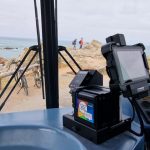A later entrant to the electric bus sector is Daimler. Its zero-emission Mercedes-Benz Citaro is here, and when it arrives in the UK in 2019, it is set to deliver a strong challenge to the zero-emission status quo
Daimler set out on a graduated journey to urban bus electrification last week when it unveiled the battery-powered Mercedes-Benz Citaro.
The manufacturer has not rushed to market. It has taken time – more time that its competitors – to ensure that the product is integrated, reliable and robust. The latter two also apply to its range promise, which starts modestly but will grow rapidly.
Boasting what Daimler calls “a hitherto unknown standard of energy efficiency,” the electric Citaro uses a modular lithium ion battery package and a ZF drive axle with hub motors.
Charging is via plug-in or, in the future, opportunity replenishment. The latter is set to be a temporary offering; Head of Product Engineering Gustav Tuschen took an intriguing and thinly-veiled shot at those who believe it to be a long-term proposition.
The debut electric Citaro has 243kW/h of energy storage. That gives a promised range of 150km; modest, but one that Daimler says is reliable and achievable in temperatures from sub-zero to tropical thanks to a highly-efficient climate control system.
Steady as she goes
There is no doubt that the electric Citaro is at the pinnacle of bus engineering. Daimler has invested €200m in it, but is at pains to clarify that diesel retains a long-term future.
“We expect 75% of the European city bus market to be for electric vehicles by 2030, but in other regions adoption will be slower,” says outgoing Head of Daimler Buses Hartmut Schick. “We cannot stop making diesel better. We must be open to all technologies and offer the best.”
Integral to Daimler’s belief that electric will come to dominate urban bus orders is its claim that, by 2030, the zero-emission Citaro’s total cost of ownership (TCO) will be lower than than of a comparable diesel.
But 2030 is a long way away, and Daimler does not pretend otherwise. It also does not insist that the battery-powered Citaro is currently as cost-effective as a diesel.
“An electric is much more expensive than a diesel. That is fact,” says Mr Tuschen. “But the TCO gap will decrease from what it is now. We don’t know exactly when the value for an electric bus will beat that of a diesel, but it will at some point.”

Battery technology is key
Increases in batteries’ energy density is what growing the electric Citaro’s range hinges on. Currently, 1kW/h accounts for 10kg of batteries.
Daimler is certain that significant improvements will come by 2030, by which time electric will be able to handle the vast majority of duties on one charge.
In the shorter term, it expects the second generation of electric Citaro to deliver a reliable, practical 250km range. By 2030, promises Mr Tuschen, that will have increased to 400km, making the need for opportunity charging a thing of the past.
By then, “many an expensive charging mast will be no more than a landing pad for pigeons,” he says.
The technical bits
Daimler splits the batteries between the rear and the roof. As shown, the electric Citaro weighs around 13,100kg unladen; when plated at above 18,000kg GVW, that gives a total passenger capacity of around 80.
Arguably the most impressive aspect of the electric Citaro is its roof-mounted combined heating and air-conditioning unit. It maintains the temperature of the batteries, cab and passenger area, and it will be standard on all electric Citaros.
Daimler recognises that heating and cooling the bus is a major power draw, and that is taken into account by its conservative initial range promise. Compared to a diesel-fuelled model, the energy requirement to heat and/or cool an electric Citaro is cut by 40%. A heat pump combined with side wall fans warms the saloon. The cab is dealt with separately. In extreme climates a diesel-fired auxiliary heater can be added, but Daimler’s projections show that it will be unnecessary here.
And what of the UK? The first electric Citaro will arrive within two years, promises Head of Marketing, Sales and Aftersales Ulrich Bastert. That means that UK deliveries will begin with the second generation of bus, which will deliver a robust 250km range.
But above all else, Daimler is clear on one thing about the electric Citaro. It is an addition to a city bus range that is the world’s most successful, but it is also a useable addition.
“Our goal was not to be the first,” says Mr Tuschen. “Our ambition is to be the best.” The manufacturer has shown intent that it intends to follow through on that aspiration.
routeone comment
That Daimler would introduce an electric Citaro is no surprise. What is more interesting is the manner in which it is approaching the project.
Daimler is among the first manufacturers to take into account two things that are linked: Usable ‘real life’ range under all climate conditions, and providing a comprehensive saloon heating and cooling system that is as energy-efficient as possible.
In the UK, heavyweight single-deckers are proving much more popular in electric form than in diesel on the basis of percentage of total orders placed.
Daimler is firmly committed to heavyweight for the electric Citaro, and it is difficult to see how anything other than a full-weight chassis could provide the 400km of usable range that it promises will be here within 12 years.
Couple that to the consultancy and associated services that a giant of the manufacturing sector can provide, and the rest of the industry has a serious challenger on its hands.

























